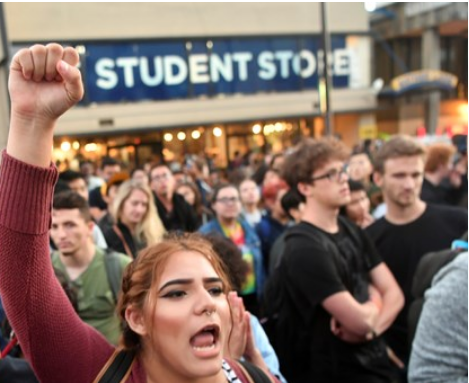If Sir Isaac Newton blew it, Americans don't have a chance
MarketWatch.com says millions of Americans are living on the edge. One in five of us has zero, or a negative, net worth, writes Quentin Fottrell, who mentions the trillion dollars in credit card debt owed by Americans, the $1.4 trillion in student loan debt and stagnant wages. He forgets about the $1.2 trillion in auto loan debt.
Gabriella Coppola writes about auto loans for Bloomberg Business, “Delinquencies have picked up, as have losses on subprime loans. Auto loan fraud, meantime, is approaching levels seen in mortgages during the bubble.”
So Americans are broke, have little income and no savings, but there are plenty of lenders to give them a shot at the American dream of a chicken in every pot, a Chevy in every driveway. plus a college degree.
Mr. Fottrell’s piece veers off into the Republican tax plan being debated and how it’d cut taxes for the rich and wouldn’t help the 1 in 5 he’s writing about. Of course, one does have to have income to pay taxes, making high income earners a target for tax cuts.
The comment section is overflowing with snarky comments, starting with “Bad work ethic and horrible financial management skills.”
However, financial management skills in an age of inflation ripe with asset boom and busts is very rare among humans. As Jason Zweig writes on his blog about Sir Isaac Newton, who had more candlepower upstairs than most of us. In fact, Zweig points out,
Newton was not just one of the world’s greatest scientists; he was a financial pioneer. As master of the Royal Mint, he pushed the British government to migrate from silver to gold as its monetary standard, instituted exact weights and measures for coinage and sternly punished counterfeiters.
Newton began piling into South Sea Company shares in June 1712, eight years before the share bubble took hold. Imagine loading up on FAANG shares in 2009. However, while FAANG stocks (Facebook, Amazon, Apple ,Netflix and Google) provide actual services, the South Sea Company only owned trading rights in the South Seas provided by the British government in exchange for refinancing England’s enormous government debt.
As University of Minnesota’s Andrew Odlyzko writes in his paper “Newton’s financial misadventures in the South Sea Bubble,”
In early 1723, South Sea Stock still made up over 70% of the British national debt. It was then split in half. Effective 25 June 1723, an owner of 100 of South Sea Stock became the owner of 50 South Sea Stock and 50 Old South Sea Annuities. These annuities were now the direct obligation of the British government, with the South Sea Company just the administrator.
Newton didn’t buy and hold as the country was swept up in a “mania that swept up everyday investors and high society alike, including merchants, widows and farmers, the poet Alexander Pope and the portraitist Sir Godfrey Kneller, as well as roughly three-quarters of the members of Parliament and even the royal family of King George I,” writes Zweig.
While Newton held 10,000 shares of South Sea stock in early 1720, he sold 8,000 shares in April and May at prices around 350, realizing profits of at least £20,000 (equivalent to nearly $4 million today.) However, just after he sold, the share price went almost straight up, brushing 800 in late May and early June, 1720.
“As the bubble continued inflating, it appears that he panicked,” Prof. Odlyzko writes of Newton. The great scientist then lost his head buying £26,000 worth of South Sea shares on June 14, 1720, at a price of about 700 per share — twice what he had sold them for only a few weeks earlier, Zweig writes.
And he didn’t stop, and as Zweig explains, “Newton had shifted from a prudent investor with his money spread across several securities to a speculator who had plunged essentially all of his capital into a single stock. The great scientist was chasing hot performance as desperately as a day trader in 1999 or many bitcoin buyers in 2017.”
Odlyzko estimates Newton lost 77% on his worst purchases.
If the guy who discovered gravity couldn’t get his finances right, how is the average American supposed to?







